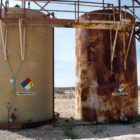2019 legislative session
Oil and gas had little to fear during legislative session
|
Storage facilities in the Permian Basin. Photo by Elizabeth Miller. Stepping to the microphone at a press conference wrapping up this year’s legislative session, House Speaker Brian Egolf, D-Santa Fe, hammered the podium to the drum beat for Queen’s “We Will Rock You” before declaring it the “best, most productive” legislative session in state history. He proclaimed major achievements in education funding, criminal justice reform, a path for carbon-free electricity — and a bill that would save 100,000 acre feet of water each year from use in oil fields. “The produced water bill, I think, is going to go down as one of the greatest environmental accomplishments to come out of the state legislature of New Mexico,” Egolf said.









